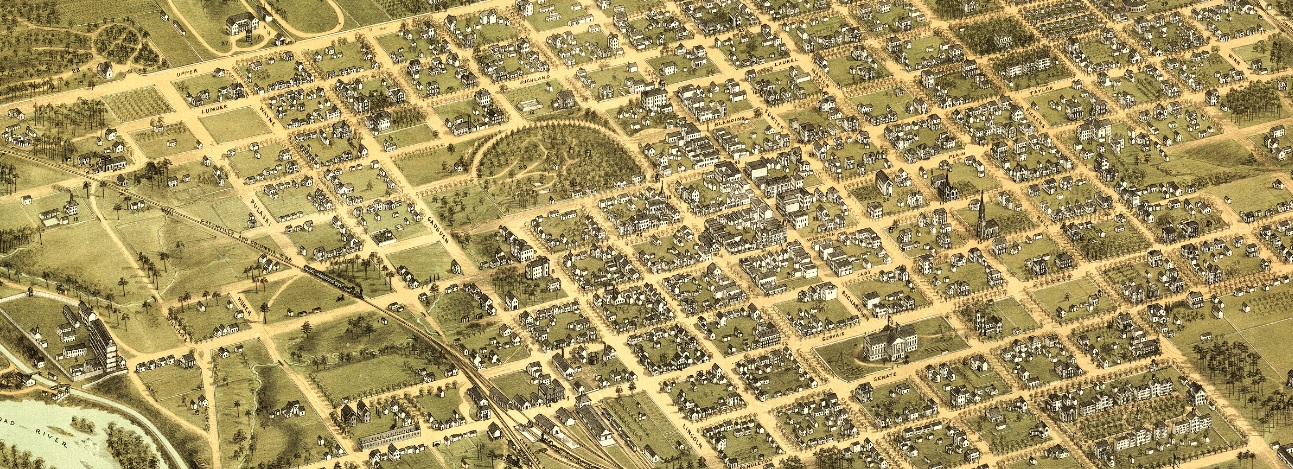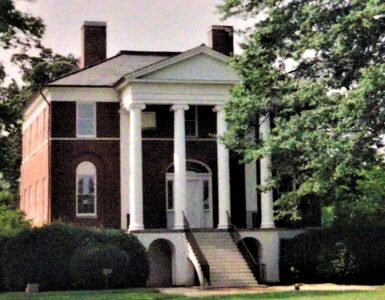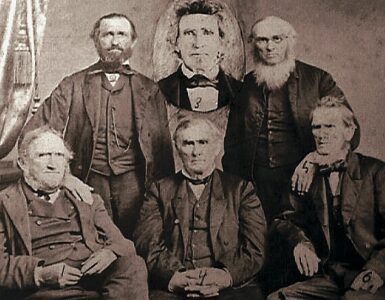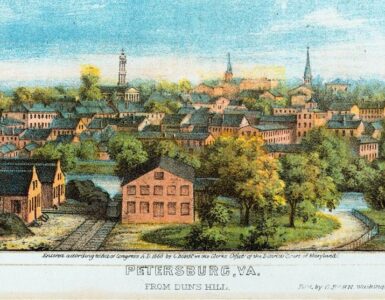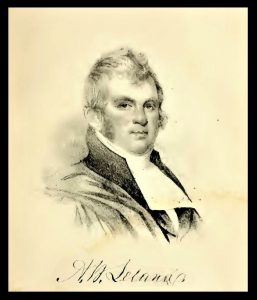 Aaron Whitney was born to Rev. John and Hephzibah (Leland) Leland in Peru, Berkshire County, Massachusetts, October 1, 1787. John was pastor of the Congregational Church in town and his wife was a second cousin. The Leland ancestry extends to the court of Henry VIII in England with the transition to American soil taking place in the middle of the seventeenth century when Henry Leland emigrated to settle in Sherburne. Little is known about the education that prepared Aaron for studies in Williams College where he graduated in 1808. He immediately moved to South Carolina arriving in Charleston and soon accepted an offer to teach in Mount Pleasant Academy. The next year he married Eliza, who was the eldest daughter of James Hibben, Sr., a member of Christ Church Parish. At some point Leland became convinced of a call to the ministry, so he continued teaching for income while studying theology privately. Harmony Presbytery took him under care as a candidate and then licensed him April 6, 1811.
Aaron Whitney was born to Rev. John and Hephzibah (Leland) Leland in Peru, Berkshire County, Massachusetts, October 1, 1787. John was pastor of the Congregational Church in town and his wife was a second cousin. The Leland ancestry extends to the court of Henry VIII in England with the transition to American soil taking place in the middle of the seventeenth century when Henry Leland emigrated to settle in Sherburne. Little is known about the education that prepared Aaron for studies in Williams College where he graduated in 1808. He immediately moved to South Carolina arriving in Charleston and soon accepted an offer to teach in Mount Pleasant Academy. The next year he married Eliza, who was the eldest daughter of James Hibben, Sr., a member of Christ Church Parish. At some point Leland became convinced of a call to the ministry, so he continued teaching for income while studying theology privately. Harmony Presbytery took him under care as a candidate and then licensed him April 6, 1811.
For the next year Licentiate Leland served vacant churches in the presbytery until he was ordained an evangelist May 2, 1812. Within a matter of months, he was called to the First Presbyterian Church (First Scots) in Charleston and was installed pastor in 1813. It is unclear the precise years of his tenure other than he would leave Charleston to become Professor of Theology in Columbia Seminary in 1833. At some point the pastorate of First Scots transitioned from Leland to Arthur Buist and according to the biography by Joseph Bardwell in Memorial Volume (see Notes) he pastored either intermittently or for a single tenure the Congregational Church on James Island for several years. During the years of Leland’s Low Country era the James Island Church was a member of the Congregational Association of South Carolina for a portion of the time but for other years it was an independent Congregational Church. It is confusing, but the gist of it is that Leland left the Low Country in 1833 to begin the call to Columbia Seminary that would continue for the rest of his life.
Leland taught and supplied pulpits until a stroke paralyzed him October 11, 1868. He was entering a store when he collapsed unconscious but was resuscitated and assisted home. The stroke had done permanent damage and he would never be the same. It was his turn that week to lead evening worship services at Columbia Seminary and he proceeded as planned despite his condition. As Bardwell expressed it, sadly, the meaning of the sermon was a mystery to everyone but Leland.
Dr. Leland continued an invalid until he passed away November 2, 1871. A memorial service was held two days later at 11:00 in First Church, Columbia, after which he was buried in the churchyard. Eliza had died December 28, 1856, and then three years later he married an immigrant from England named Clara Amelia Blight. All eleven of the children, six sons and four daughters (one died in infancy) were born to Eliza. The four daughters married ministers. The eldest daughter, Sarah Margaret, was the wife of Rev. Edwin Cater, who was the principal of the Young Ladies Institute at Bradford Springs at the time of their marriage. His second daughter had married Presbyterian minister Abner A. Porter, but she had passed away in 1845.
Aaron W. Leland was a respected and honored man. He was respected for his personal characteristics which included an obsession for system and order, and woe be to those who failed to measure up to his standards. As one might expect of such a personality, punctuality characterized him in everything. It is said that families living along the roads between Leland’s home and the Columbia Seminary campus set their timepieces as he passed to and from campus (probably a myth but entertaining). Early in his ministry he was honored with the A.M. by Brown University in 1814 and the next year at the age of twenty-eight he was given the Doctor of Divinity by South Carolina College. He was moderator of the Old School General Assembly of 1850 which met in Cincinnati. Added to the usual business passing before him such as redefining judicatory boundaries, hearing reports from seminaries and boards, making nominations and appointments, and considerable business regarding missions as the nation expanded westward, was a memorial for Princeton Seminary Professor Samuel Miller who had died in January. Senders of overtures and memorials regarding slavery were referred to previous decisions except for a memorial delivered by the Congregational Association of Massachusetts which was adopted and called for the end of slavery and declaration of it as sin. For his retiring moderator’s sermon the next year Leland’s text was 1 Corinthians 1:21, “For after that in the wisdom of God the world by wisdom knew not God, it pleased God by the foolishness of preaching to save them that believe.”
His publications readily available for this biography are limited to pamphlet discourses and a pair of sermons published in Colin McIver’s collection, The Southern Preacher: A Collection of Sermons, Philadelphia, 1824. The pamphlet items are funeral sermons and special lectures, but the McIver items provide insight into Leland’s thought “On the Proper Agency of Reason, in Matters of Religion,” and “On the Boundaries which limit the Inquiries of Reason.” Both articles should be read together for their apologetic response to the elevation of Reason over Revelation in the philosophical thought of the day.
This biography is one of the shorter ones on this site, so it will be enhanced with an excursion into the influence of Lowcountry church history and polity on American Presbyterianism.
The South Carolina Lowcountry runs along the coast beginning approximately at Georgetown and on into Georgia south of Savannah. Geographical limits of the region vary according to who is defining the bounds, but this seems to be the Lowcountry in the thinking of many South Carolinians. In the recent biography of William McWhir it was mentioned that in the Lowcountry, Congregationalism and Presbyterianism enjoyed a close relationship, so much so that at times it is difficult when reading historical documents to determine if a church was one or the other. Until the Revolution brought about the new nation, the denominational bond between the two was built on need because the church of the South Carolina Colony was the Church of England. Testimony today to the pervasiveness of Anglicanism in the Lowcountry is the abundance of still functioning Episcopal Churches as well as historical sites of parishes past. Presbyterians and Congregationalists had a common bond because they dissented from imposition of the Church of England upon them by its head, the monarch. The Presbyterian and Congregational bond was strengthened because of common doctrine as expressed in the Westminster Standards. The work of the Westminster Assembly united the two churches. This is mentioned because it is current vogue to say, doctrine divides, however historically it is clear that in the Lowcountry and the expanding American Colonies—doctrine united. Yes, there were differences as seen in the obvious congregational and presbyterian polities, but the Puritan composed Standards carried by the Scots Irish to Pennsylvania and down the Shenandoah Valley; the Confession and Testimony born with pride by the oppressed Scots fleeing Scotland to settle along the Cape Fear; and the Congregationalists who settled Plymouth and coastal South Carolina were united by a common confessional standard. This unification through confessional agreement is also seen in the use of other standards by the Reformed of Dutch, Swiss, German, and French national origins, and of course, the Lutherans. With national independence, the Lowcountry Congregationalists and Presbyterians continued their close relationship while extending their ministry with new congregations, but this relationship was increasingly strained as the years passed until it was broken by the Old School-New School division of 1837.
The term “Grassroots Presbyterianism” is particularly associated with Presbyterians in the South. The gist of it is that the elders collected in judicatories called presbyteries, synods, and a general assembly serve their constituent congregations by dealing with items of common interest such as appeals of discipline, review of judicatory records, and revision of standards. The judicatories exist to serve the local churches. Congregationalism in the Lowcountry gave South Carolina and Southern Presbyterians in general an increased sense of the importance of local rule of the congregation. Aaron W. Leland came from a congregational background and ministered in the Lowcountry including pastoring a Congregational Church, and other ministers who taught in Columbia Seminary were influenced by Lowcountry experience including John L. Girardeau, John B. Adger, and James H. Thornwell. Grassroots Presbyterianism came from Lowcountry influences and was distributed in the South through divinity instruction at Columbia Theological Seminary.
Barry Waugh
Notes: The header map is Columbia, South Carolina, in 1872; the seminary campus is the large building near the upper right corner and the campus of the University of South Carolina (South Carolina College) can be seen in a horse-shoe form towards the lower right corner (the whole map may not be visible on all device screens); the State House is at lower right center. The main source is Joseph Bardwell’s “Memorial of Aaron Whitney Leland, D. D.,” in Memorial Volume of the Semi-Centennial of the Theological Seminary at Columbia, 1884, which relies heavily on the memorial committee of the Synod of South Carolina’s report in honor of Leland as in the minutes of 1871; the committee was chaired by George Howe. Some information (not as much as one might hope) is provided in Sherman Leland’s, The Leland Magazine, or a Genealogical Record of Henry Leland, and His Descendants, Containing an Account of Nine Thousand Six Hundred and Twenty-Four Persons, in Ten Generations and Embracing Nearly Every Person of the Name Leland in America, from 1653-1850, Boston, 1850, which shows marriages of cousins was not uncommon for the family; the portrait is from this book; please note that there are two Aaron Lelands in this book with the correct one distinguished by his middle name. In First Presbyterian Church Charleston, S.C., Reminiscences and Centennial Exercises, 1915, the gallery of pastors indicates uncertainty in the transition from Leland to Buist with no end of tenure for Leland nor beginning for Arthur Buist. The Historical Catalogue of Brown University, 1764-1904, 1905, includes a very brief account of biographical information, and the General Catalogue of the Officers and Graduates of Williams College, 1905, gives the bare minimum. For more on Congregationalism and the Lowcountry see Donald J. Auld.


